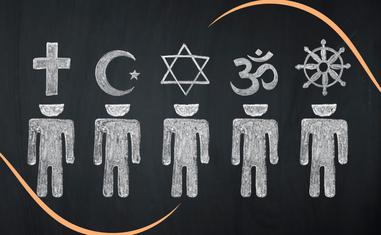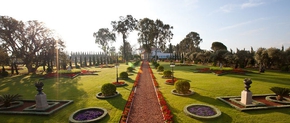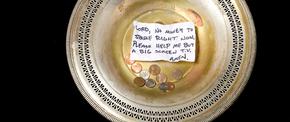The views expressed in our content reflect individual perspectives and do not represent the authoritative views of the Baha'i Faith.
Probably because I’ve been editing and writing here at BahaiTeachings.org for almost a decade, I get a steady stream of mail from readers who want to talk about their beliefs.
The vast majority of the letters, emails, and comments we get here would light up a room: “Incredible!” “I’m so happy I found this site and this Faith!” “These Baha’i teachings have changed my life!” [All actual comments…]
RELATED: When You Become a Baha’i
A couple of not-so-wonderful letters, however, have followed a predictable pattern: “My religion is the correct one, and yours is incorrect.” (the verbiage tends to vary, and can even veer toward insulting and hostile, but you get the general idea)
The other day, for example, I had an email exchange with a reader who maintained that his Faith represented the final word in religion. He said, and I quote, “Every prophet who comes after (my prophet) is a false prophet.”
This spurious claim has plagued the history of religion forever. It has led to estrangement, conflict, and sectarianism. It has even started wars. It has separated the people of the Earth from one another.
The Baha’i writings vigorously and emphatically counter the false assertion that any religion has a claim to finality.
As just one example, the Guardian of the Baha’i Faith, Shoghi Effendi, wrote in “The Promised Day is Come:”
Repudiating the claim of any religion to be the final revelation of God to man, disclaiming finality for His own Revelation, Baha’u’llah inculcates the basic principle of the relativity of religious truth, the continuity of Divine Revelation, the progressiveness of religious experience.
So let’s look for a minute at the origin of this kind of elitist claim to religious finality, and see if we can make any sense of it.
First, every one of the prophets and founders of the world’s major Faiths have prophesied their own return. The holy scriptures of each global religion document those prophecies and promises. Moses promised to return as the Lord of Hosts and the Messiah. Christ promised he would come again “in the glory of the Father,” and said in John 14:3 that “I will come again and receive you to Myself …” Muhammad promised he would return as the Mihdi and the Messiah, and told his followers that Christ would return, as well. Buddha said there would be more Buddhas, leading up to “the fifth Buddha.” Zoroaster predicted his return as the “world renovator,” the Shah-Bahram. Hindus believe in the reincarnation of Krishna himself, who promised in the Bhagavad-Gita that he would re-appear “from age to age.”
Second, none of those founders of Faith made any claim to finality. In fact, they’ve said the exact opposite. In the Gospel of Mathew, Christ said: “Howbeit when he, the Spirit of truth, is come, he will guide you into all truth …” In the Qur’an, Muhammad said that a new prophet would bring peace and justice to the world, which is why Muslims await the appearance of the Twelfth Imam or the Mahdi.
Multiple Indigenous traditions from all over the world have similar prophecies about the coming of a universal redeemer who will usher in an era of unity and harmony amongst all humanity.
RELATED: How Baha’is Promote the Recognition of Indigenous Beliefs
But third, and despite all of those prophecies and promises, some of the followers of the world’s major Faiths today still believe in complete religious exclusivity. Jewish authorities have refused to recognize Christ’s message for two thousand years. Hindus have attacked Muslims for believing in a prophet who came later than their own. Catholic doctrine says, in the official catechism of the church, that after Christ, “There will be no further Revelation.” Islamic doctrine, among most of the world’s Muslims, says that Muhammad is “the seal of the prophets,” which supposedly means, to quote from one Muslim interpretation online:
When a document is sealed, it is complete, and there can be no further addition. The Holy Prophet Muhammad closed the long line of Messengers. Allah’s teaching is and will always be continuous, but there has been and will be no Prophet after Muhammad.
The single short passage in Qur’an 33:40 calling Muhammad “the seal of the prophets” has been used for centuries now to claim finality and exclusivity – but the Baha’i teachings say it simply means that one prophetic cycle ended with Muhammad, and now another has begun. Obviously, if God’s teachings “will always be continuous,” as the Qur’an repeatedly points out, then no prophet could ever be the last prophet.
Without going through every possible example of these claims to religious elitism and exclusivity – since there are thousands, enough to fill many volumes – suffice it to say that generations of believers in each religion have gradually been told by their priests, clerics, and rabbis that their Faiths are superior to all others. Those exclusivity and triumphalism claims, designed to hold on to a religion’s adherents and therefore protect the power of the priestly class, are simply false, as any careful student of comparative religion will readily recognize.
The Baha’i teachings point all of this out, chiefly in Baha’u’llah’s Book of Certitude, where the prophet and founder of the Baha’i Faith characterized all of God’s prophets as one:
… they are all but Messengers of that ideal King, that unchangeable Essence. And were they all to proclaim: “I am the Seal of the Prophets,” they verily utter but the truth, beyond the faintest shadow of doubt. For they are all but one person, one soul, one spirit, one being, one revelation.
The founders of the world’s great Faiths, Baha’u’llah said in the same book, “… all partake of the fruit of the same Tree of Oneness:”
… the Bearers of the trust of God are made manifest unto the peoples of the earth as the Exponents of a new Cause and the Bearers of a new Message. Inasmuch as these Birds of the Celestial Throne are all sent down from the heaven of the Will of God, and as they all arise to proclaim His irresistible Faith, they therefore are regarded as one soul and the same person. For they all drink from the one Cup of the love of God, and all partake of the fruit of the same Tree of Oneness.
Any claim of elitism, triumphalism, or exclusivity in religion, Baha’is believe, fails to recognize this essential oneness, not only of faith but of the Creator Himself.

















Comments
Sign in or create an account
Continue with Facebookor